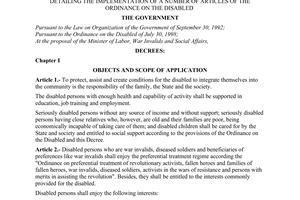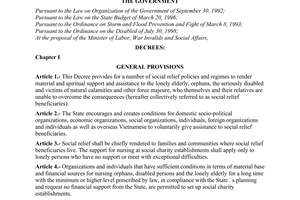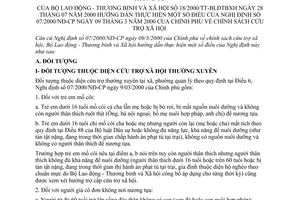Nội dung toàn văn Circular No. 18/2000/TT-BLDTBXH of July 28, 2000 guiding the implementation of a number of articles of The Government’s Decree No. 07/2000/ND-CP of March 9, 2000 on social relief policies
|
THE
MINISTRY OF LABOR, WAR INVALIDS AND SOCIAL AFFAIRS |
SOCIALIST
REPUBLIC OF VIET NAM |
|
No: 18/2000/TT-BLDTBXH |
Hanoi, July 28, 2000 |
CIRCULAR
GUIDING THE IMPLEMENTATION OF A NUMBER OF ARTICLES OF THE GOVERNMENT’S DECREE No. 07/2000/ND-CP OF MARCH 9, 2000 ON SOCIAL RELIEF POLICIES
Pursuant to the Government’s Decree No. 07/2000/ND-CP of March 9, 2000 on social relief polices, the Ministry of Labor, War Invalids and Social Affairs hereby guides the implementation of this Decree as follows:
A. BENEFICIARIES
I. BENEFICIARIES OF REGULAR SOCIAL RELIEF
Beneficiaries of regular social relief under the management of communes and wards prescribed in Article 6 of the Government’s Decree No. 07/2000/ND-CP of March 9, 2000 shall include:
1. Regarding orphans:
a/ Under-16 children whose both parents are dead or who have been abandoned, lost their nurturing sources and have no relatives (paternal and maternal grandparents, lawful adoptive parents, elder brothers and sisters) to rely on.
b/ Under-16 children whose either parent is dead while the other parent is missing under Article 88 of the Civil Code or is incapable or unable to bring up his/her children (for instance, being seriously disabled, or serving imprisonment sentences in prisons) and who have no nurturing sources nor relatives to rely on.
If orphans mentioned at Points a and b above still have relatives who, however, are incapable to bring them up (the relatives are under 16 years of age or above 60 years of age, or are seriously disabled, serving imprisonment sentences in prisons, or whose families are categorized as poor households according to the criteria announced for different periods of time by the Ministry of Labor, War Invalids and Social Affairs), they shall be considered for entitlement to social relief allowances.
2. Regarding lonely elderly persons without support:
a/ Those who are full 60 years of age or older, live alone and have no children (biological or lawful adopted children, have no grandchildren nor relatives to rely on, and have no income sources.
b/ Those who are full 60 years of age or older, whose spouse is still alive but senile, have no biological or lawful adopted children, no grandchildren nor relatives to rely on, and have no income sources.
If elderly persons mentioned at Points a and b above still have children, grandchildren and/or relatives who, however, are incapable to nurse them (because, for example, their families are poor, their children, grandchildren and/or relatives themselves are under 16 years or above 60 years of age, or are serving imprisonment sentences in prisons, or seriously disabled), they shall be also considered for entitlement to social relief allowances.
Particularly for old and lonely women who have no one to rely on, no income sources and aged full 55 years or older, are enjoying social relief allowance, they shall continue to enjoy it.
3. For beneficiaries who are seriously disabled persons or chronic mental patients as prescribed in Clauses 3 and 4, Article 6 of Decree No. 07/2000/ND-CP of March 9, 2000, Circular No. 13/2000/TT-BLDTBXH of May 12, 2000 of the Ministry of Labor, War Invalids and Social Affairs guiding the implementation of a number of articles of the Government’s Decree No. 55/1999/ND-CP of July 10, 1999 detailing the implementation of the Ordinance on the Disabled shall apply.
II. BENEFICIARIES OF IRREGULAR SOCIAL RELIEF
Beneficiaries of irregular social relief prescribed in Article 14 of the Government’s Decree No. 07/2000 of March 9, 2000, including persons or households facing difficulties due to natural calamities or force majeure circumstances, shall be determined as follows:
1. Families:
a/ Families with members who are dead or missing due to natural calamity consequences or while taking part in rescuing people and property of the State and people.
b/ Families with collapsed, swept away, burnt or seriously damaged houses, being rendered homeless. For families living aboard boats or ships which have been smashed, sunk or seriously damaged, and now becoming homeless, they shall be also considered for relief.
c/ Families that have lost their principal means of production and suffer from hunger.
2. People:
a/ Persons who are seriously injured due to natural calamities or while taking part in rescuing people’s life or the State’s or people’s property.
b/ Persons who suffer from pre-harvest hunger or are members of poor families.
c/ Persons who are dead or hospitalized for serious injury due to some misfortune outside their place of residence while their families are not aware thereof and thus cannot take care of or bury them.
d/ Wandering beggars who are gathered into social relief establishments by the provincial/municipal Police in coordination with the provincial/municipal Labor, War Invalids and Social Affairs and waiting for being sent back to their families.
B. SOCIAL RELIEF REGIME
I. REGULAR SOCIAL RELIEF
1. Level of regular social allowance;
Orphans who have lost their nurturing sources, lonely elderly persons without support and income sources prescribed in Article 10 of the above-said Decree shall receive the minimum level of allowance. The presidents of the provincial-level People’s Committees may adjust such level suited to the practical conditions of their localities, which, however, must not lower than the level prescribed below;
- Regular social allowance for beneficiaries living with their families and under the management of communes or wards: 45,000 VND/person/month.
- Nurturing allowance at the State-run social relief establishments: 100,000 VND/person/month; Particularly for under-18-month infants who need to be fed with milk, the allowance level shall be 150,000 VND/infant/month.
2. Allowances other than the regular allowance for beneficiaries living at social relief establishments
Allowances for beneficiaries living at the State-run social relief establishments prescribed in Article 11 of the above-said Decree shall be determined as follows:
a/ Allowance for buying personal articles in service of daily life activities such as clothes, face towels, tooth brush and paste, detergents, plastic slippers, blankets, mats, mosquito nets.
b/ Allowance for buying common curative medicines according to the list of medicines prescribed for public employees available at the agencies’ medical centers.
c/ Allowance for buying textbooks and learning aids, for children who are taking general education or supplementary education classes. The allowance level shall vary according to the educational levels and grades.
d/ Allowance for personal hygiene, for female beneficiaries in the fertility age bracket.
e/ Allowance for funeral costs.
The presidents of the provincial-level People’s Committees shall decide the above-mentioned allowance levels suitable to the practical conditions of their respective localities.
II. IRREGULAR SOCIAL RELIEF
1. Beneficiaries prescribed at Point a, Clause 1, Section II of Part A shall be entitled to the single irregular social relief allowance for the funeral of dead persons or the single allowance for families to buy things as offerings to missing persons.
In cases where the local administration or agency organizes the funeral of a dead person, it shall be also receive payment therefor equal to the allowance level enjoyed by the dead person’s family.
2. Beneficiaries prescribed at Point b, Clause 1, Section II of Part A shall enjoy the single irregular social relief allowance for rebuilding and repairing their houses.
3. Beneficiaries prescribed at Point c, Clause 1 and Point b, Clause 2, Section II of Part A shall receive hunger relief support for one to three months.
4. Beneficiaries prescribed at Point a, Clause 2, Section II of Part A shall receive partial support for their hospitalization expenses.
5. Beneficiaries prescribed at Point c, Clause 2, Section II of Part A shall receive partial support for their hospitalization expenses. In cases where such a beneficiary dies, the local administration or agency that organizes his/her funeral shall also receive a payment equal to the dead person’s family’s allowance level as prescribed in Clause 1, Section II of Part B above.
6. Beneficiaries being wandering beggars during the time of being gathered and classified shall receive a daily allowance of VND 5,000 for no more than 15 days.
The irregular social relief allowance level for each group of beneficiaries prescribed in Clauses 1 and 2, Section II, Part A of this Circular shall be decided by the presidents of the provincial-level People’s Committees, depending on the extent of damage, hunger and resource mobilization capability.
C. ORGANIZATION OF IMPLEMENTATION
1. Beneficiaries being orphans or lonely elderly persons without support, who wish to enjoy regular social relief allowances, must file written applications, by themselves or their relatives, clearly describing their situation and requesting the commune-level People’s Committees to consider and propose their cases to the district-level People’s Committees for decision.
Those who are entitled to regular social relief prescribed in Article 6 of the Government’s Decree No. 07/2000/ND-CP of March 9, 2000, if facing exceptional difficulties which render them unable to support themselves and wishing to be admitted into the State-run social relief establishments, must file written requests, by themselves or their relatives, to the competent authorities for consideration and decision.
2. The commune-level People’s Committees shall have the responsibility to:
+ Make a list of beneficiaries stipulated in Section I, Part A of this Circular and get it approved by the commune-level Consideration and Approval Councils to propose social allowances for these subjects; and for subjects meeting with exceptionally difficult circumstances, propose them be admitted to the social relief establishments.
+ When hunger or natural calamities occur, make a list of beneficiaries stipulated in Clauses 1 and 2, Section II, Part A of this Circular, get it approved by the commune-level Consideration and Approval Council to propose irregular social relief for them.
+ Particularly for those who suffer misfortunes outside their place of residence as stipulated at Point c, Clause 2, Section II, Part A of this Circular, their cases shall be dealt with as follows:
- For injured persons: The medical establishments that have directly treated these persons shall make a list thereof and send it to the Labor, War Invalids and Social Affairs agencies of the localities where the medical establishments are based for submission to the competent authorities for decision on the irregular relief levels.
- For dead persons, the administrations, organizations or individuals that organize their burials shall make a list thereof and send it to the district-level Labor, War Invalids and Social Affairs Sections of the localities where such dead persons are buried for submission to the competent authorities for decision on the allowance levels for funeral costs.
+ Set up the Consideration and Approval Council, which is composed of the chairman being the president or a vice-president of the People’s Committee, members being representatives of the Fatherland Front and several departments and branches and a standing member who is an official in charge of the Labor, War Invalids and Social Affairs work. The Consideration and Approval Councils must make written conclusions and the enclosed lists of eligible beneficiaries;
After the lists of eligible beneficiaries are approved by the Consideration and Approval Councils, the presidents of the commune-level People’s Committees shall make official dispatches proposing the district level People’s Committee presidents to consider and make decision thereon. Such an official dispatch must be enclosed with the report of the Consideration and Approval Council, a proposed list of regular social relief allowance beneficiaries, dossiers of social beneficiaries who face exceptionally difficult circumstances and are proposed for being admitted to social relief establishments, a proposed list of families and units in need of irregular social relief.
+ Make a book on the management and payment of monthly social allowances to regular social relief beneficiaries;
+ Organize the reception of regular social relief beneficiaries returning to the localities from the social relief establishments. Create favorable conditions for them to stabilize their life and integrate themselves into the community.
+ Make a book on the receipt and distribution of irregular relief money and goods.
+ Organize the direct and timely provision of irregular social relief to the beneficiaries in the localities.
3. The district-level Labor, War Invalids and Social Affairs or Labor Organization and Social Affairs Sections shall have to:
+ Sum up the lists of regular and irregular social relief beneficiaries proposed by the commune-level People’s Committees for social relief allowances; on the basis of the capability of their districts’ allowance funding sources as well as the guidance of the provincial/municipal Labor, War Invalids and Social Affairs Services, report to the district-level People’s Committee presidents for decision on the social relief allowances in the community and irregular social relief allowances.
+ For social beneficiaries who meet with exceptionally difficult circumstances and are proposed by the communes for admission to the social relief establishments, complete the dossiers thereof and propose the district-level People’s Committees for making decision thereon (if the concerned social relief establishments are managed by the districts) or sending to the provincial/municipal Labor, War Invalids and Social Affairs Services for consideration and decision (if the concerned social relief establishments are managed by the provinces).
+ Make and send sum-up reports to the district-level People’s Committee presidents for decision upon cutting allowances for those who are no longer eligible.
+ Guide the communes to organize the implementation of the support policies toward social beneficiaries and the provision of irregular social relief.
4. The provincial/municipal Labor, War Invalids and Social Affairs Services shall have the responsibility to:
+ Annually, on the basis of the numbers of beneficiaries, the allowance levels for each category of beneficiaries, elaborate plans on the funding for regular and irregular social relief allowances and send them to the provincial/municipal Finance and Pricing Services and the Planning and Investment Services for submission to the provincial/municipal People’s Committee presidents for decision.
+ Sum up the lists of irregular social relief beneficiaries proposed by the district-level People’s Committees. On the basis of the provinces’ and the central level’ allowance funding sources and other aid sources, elaborate irregular social relief plans and send them to the provincial/municipal Finance and Pricing Services for submission to the provincial/municipal People’s Committee for decision.
+ Guide the subordinate levels to organize the payment of regular and irregular social relief allowances.
+ Issue decisions on admitting regular social relief beneficiaries who meet with exceptionally difficult circumstances to the social relief establishments under their management, and on irregular social allowances for the beneficiaries stipulated at Point d, Clause 2, Section II, Part A of this Circular.
5. The social relief establishments shall have to:
+ Admit social beneficiaries by decisions of the competent authorities, organize the nursing of and ensure the material, cultural and spiritual life for social relief beneficiaries under their management.
+ Mobilize agencies, organizations and individuals to support social beneficiaries who meet with exceptional difficulties, manage and use the mobilized sources according to the current regulations so as to raise the material and spiritual life of the social beneficiaries.
+ Take measures to nurse and ensure good health for social beneficiaries and improve their capability to integrate into their community, coordinate with the localities in sending beneficiaries back to their homes when conditions permit.
+ Decide on sending beneficiaries who have conditions to integrate themselves into their community back to their localities.
6. When natural calamities occur on a large scale, the People’s Committees of all levels shall set up steering committees for reception and distribution of relief money and goods, each shall have the People’s Committee president or vice-president as its head, a leading official of the Labor, War Invalids and Social Affairs service as its standing deputy-head, and leading officials of the Finance and Pricing service, the concerned departments and branches, the local Front Fatherland and the Red Cross Society as its members. These committees shall have the duty to receive and distribute relief money and goods; direct the setting up of shock teams to provide urgent and timely relief for inhabitants, especially in remote, deep-lying, difficult and isolated areas.
D. IMPLEMENTATION PROVISIONS
This Circular takes effect 15 days after its singing.
The previous provisions contrary to this Circular are all annulled.
Any problems arising in the course of implementation should be promptly reported to the Ministry of Labor, War Invalids and Social Affairs for study, consideration and settlement.
|
MINISTER OF LABOR, WAR INVALIDS AND SOCIAL AFFAIRS |


